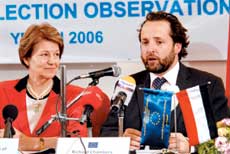SANAA, 22 September 2006 — The European Union election observation team in Yemen yesterday said that the presidential and local elections in Yemen presented an “open and genuine contest.”
In its preliminary report on Wednesday’s polls, in which incumbent President Ali Abdullah Saleh had a resounding lead, the mission said the vote “saw an open and genuine contest take place, marking a major milestone in the democratic development of Yemen.”
The report, which was read out during a press conference here by the EU chief observers Baroness Nicholson, noted that the elections “presented a notable opportunity in the region for an incumbent head of state to face a real challenger at the polls.”
EU observers evaluated the voting process as “good or very good in over 82 percent of polling centers they visited,” said the report.
In the country’s second direct presidential election on Wednesday, the long-serving President Saleh faced a newly united opposition, with most rivals falling in behind a single candidate — the popular former Oil Minister Faisal Bin-Shamlan — who is backed by five major opposition parties.
Vote counting so far suggests an easy win for Saleh, who has the support of a clear majority of Yemenis. They see him as a hero who managed to achieve and preserve the country’s reunification.
Saleh’s opponents accuse him of becoming increasingly authoritarian while failing to fight deep-seated problems such as corruption and poverty in the impoverished Arab country.
Nicholson said the elections represented a “crucial indicator of commitment” by the Yemeni authorities to strengthen the democratic processes of the country. She, however, cited many instances where state resources were used in favor of the campaign of the ruling General People’s Congress party, headed by Saleh.
The EU chief observer said the Supreme Election Commission (SEC) did not take steps to enforce campaign regulations that prevent the abuse of state resources or allow scrutiny of campaign financing.
Nicholson also said “procedural irregularities” were observed in polling stations across the country, particularly within rural areas and inside female polling stations. “Of the polling stations visited, breaches of the secrecy of the vote were observed in 19 percent, illegal assistance of voters in 13 percent and clearly under-aged voters were seen to vote in seven percent of polling stations,” she said.
Final results of the presidential vote have yet to be declared, but official partial results showed a lead for President Saleh with more than 80 percent of the votes.
The initial figures were announced late Wednesday a few hours after polls closed on a day that saw at least three people killed in election-related violence, including an opposition candidate for a local council.
Head of the SEC, Khaled Al-Sharif, told reporters that President Saleh received 2 million votes out of over 2.4 million votes so far counted.
Saleh’s main rival, Bin-Shamlan, received over 442,000 votes, Al-Sharif said. Three other candidates received two percent of the counted vote.
Sharif said the results were tentative and that the final results would likely be declared by today. He would not say how many voters cast their votes, but official estimates put the figure at over 5 million of the country’s 9,248,000 eligible voters.


